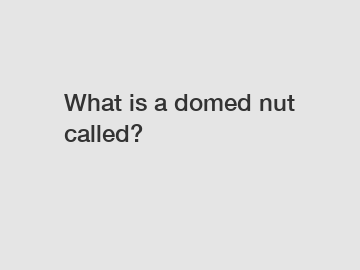What is a domed nut called?
Have you ever found yourself in a situation where you needed to fasten a nut onto a bolt, only to realize that the standard nuts you have just won't cut it? This is where specialty nuts come into play, and one such type is the domed nut.
Domed nuts, also known as acorn nuts or crown nuts, are unique in their design and functionality. These nuts feature a dome-shaped top that covers the exposed threads of a bolt, providing a more finished and aesthetically pleasing look. But what exactly is a domed nut called, and what are its uses and benefits?
The domed nut is often referred to as an acorn nut due to its resemblance to the acorn fruit of an oak tree. The name "acorn nut" perfectly captures the shape and design of this specialty nut, making it easy to identify and differentiate from other types of nuts. Additionally, the term "crown nut" is also commonly used to describe domed nuts, as the dome shape resembles a crown sitting atop the bolt.

So, what are the uses of a domed nut? Domed nuts are primarily used for aesthetic purposes, providing a polished and finished look to various assemblies and applications. These nuts are commonly used in decorative applications such as furniture, lighting fixtures, and automotive accessories, where appearance plays a significant role in the overall design. The domed shape of the nut not only conceals the threads of the bolt but also adds a touch of elegance and sophistication to the finished product.
In addition to their aesthetic appeal, domed nuts also offer functional benefits. The dome shape of the nut provides a smooth surface that helps prevent snagging and scratching on surrounding objects or materials. This can be particularly useful in applications where the nut is exposed and may come into contact with other components or surfaces.
Furthermore, the domed shape of the nut helps distribute pressure and weight more evenly across the surface, reducing the risk of damage or deformation to the materials being fastened. This can be especially important in applications where tight tolerances and precision are crucial to the performance and longevity of the assembly.
The unique design of domed nuts also makes them ideal for use in areas where space is limited or where a low-profile nut is required. The rounded shape of the nut allows it to be easily installed and removed in tight spaces, making it a versatile solution for a wide range of applications.
In terms of material and construction, domed nuts are typically made from durable and corrosion-resistant materials such as stainless steel, brass, or aluminum. This ensures that the nut remains secure and reliable even in harsh or demanding environments. Additionally, domed nuts are available in a variety of sizes and thread types to accommodate different bolt sizes and applications.
Overall, the domed nut is a versatile and practical fastening solution that offers both aesthetic appeal and functional benefits. Whether you're looking to add a finishing touch to your project or need a reliable and durable fastening option, the domed nut is a worthy choice.
In conclusion, the domed nut, also known as an acorn nut or crown nut, is a specialty fastening solution that offers both style and substance. With its unique design and functionality, this nut is a versatile option for a wide range of applications where appearance and performance are key. So the next time you're in need of a nut that stands out from the rest, consider the domed nut for a secure and polished finish.
If you want to learn more, please visit our website hot rolled threaded rebar wholesale, hot rolled rebar for sale, 20mm rebar.
195
0
0

Comments
All Comments (0)